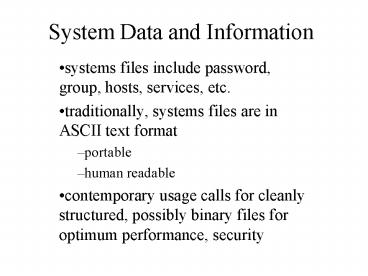System Data and Information - PowerPoint PPT Presentation
1 / 18
Title:
System Data and Information
Description:
System Data and Information systems files include password, group, hosts, services, etc. traditionally, systems files are in ASCII text format portable – PowerPoint PPT presentation
Number of Views:85
Avg rating:3.0/5.0
Title: System Data and Information
1
System Data and Information
- systems files include password, group, hosts,
services, etc. - traditionally, systems files are in ASCII text
format - portable
- human readable
- contemporary usage calls for cleanly structured,
possibly binary files for optimum performance,
security
2
passwd File
- structure defined in pwd.h
- traditionally contains seven elements
- username
- encrypted password
- user ID
- group ID
- comment (GECOS)
- home directory
- default shell
3
passwd File Entries
- contains root (UID 0)
- one-way encrypted password
- can be reverse engineered if visible
- fields may be empty
- some systems support structured comment field
4
passwd functions
- five basic functions
- getpwuid() - fetch entry from uid
- getpwnam() - fetch entry from login name
- getpwent() - get next entry
- setpwent() - rewinds stream(s)
- endpwent() - closes stream(s)
5
passwd function details
- getpwuid, getpwnam, and getpwent all return
pointers to passwd entry structures - passwd entry structures are usually static within
the function, and are overwritten by subsequent
calls - getpwent opens files automatically, but endpwent
must be called to close.
6
Shadow Passwords
- encrypted passwords can be exploited for access
to systems - scan dictionary for common matches
- encrypt and compare
- shadow password files hide encrypted passwords
from world - only limited number of system programs need
access to encrypted passwords in shadow file
7
Group File
- group file structures contain four elements
- group name
- encrypted password (almost never used)
- group ID
- array of ptrs to user names
8
group file functions
- like passwd, five basic file functions
- getgrgid() - fetch entry from gid
- getgrnam() - fetch entry from login name
- getgrent() - get next entry
- setgrent() - rewind stream(s)
- endgrent() - close streams(s)
9
Supplementary Group IDs
- originally, all users had one (login) group
- newgrp command used to change effective GID
- today, users can belong to as many as 16
supplementary groups - file permissions are checked against both login
group, and supplementary groups
10
Supplementary GID functions
- there are three primary supplementary GID
functions - getgroups() - get supplementary GIDs for user
- setgroups() - set supplementary GIDs for user
(superuser only) - initgroups() - read group file and set groups
including login group (superuser only)
11
Accessing Other System Data Files
- other files use same access function types
- two keyed search functions (if supported)
- three file walking functions
- get next entry
- set to first entry (rewind)
- end (close all files)
12
Other Data Files
- some data files common to almost all
installations - hosts - list of hostnames matched to network
addresses - networks - list of networks supported
- protocols - list of protocols supported
- services - list of services supported
13
uname() details
- uname returns five element structure
- sysname - name of OS
- nodename - name of node
- release - current release of OS
- version - current version of release
- machine - hardware type
14
Login Accounting
- two primary login accounting files
- utmp - currently logged in users
- wtmp - all logins and logouts
- structures vary from machine to machine
- not all machines have low level functions for
access - those that do have functions that generally
mirror the other file access functions, a get,
a set, and an end
15
System Identification
- two primary functions for access to system ID
information - uname() - returns structure with host information
- gethostbyname() - returns network hostname
16
Time and Date
- basic time service returns number of seconds
since epoch (1/1/70). - time_t times are referred to as calendar times
- break down functions convert time_t to tm
structure - formatting functions produce user friendly
output
17
Time tm structure functions
- three main functions
- break down functions
- gmtime() - universal time
- localtime() - local time
- build up function
- mktime() - convert tm to time_t
18
time formatting functions
- three main formatting functions
- asctime() - default time string from tm
- ctime() - default time string from time_t
- strftime() - programmer definable format from tm































